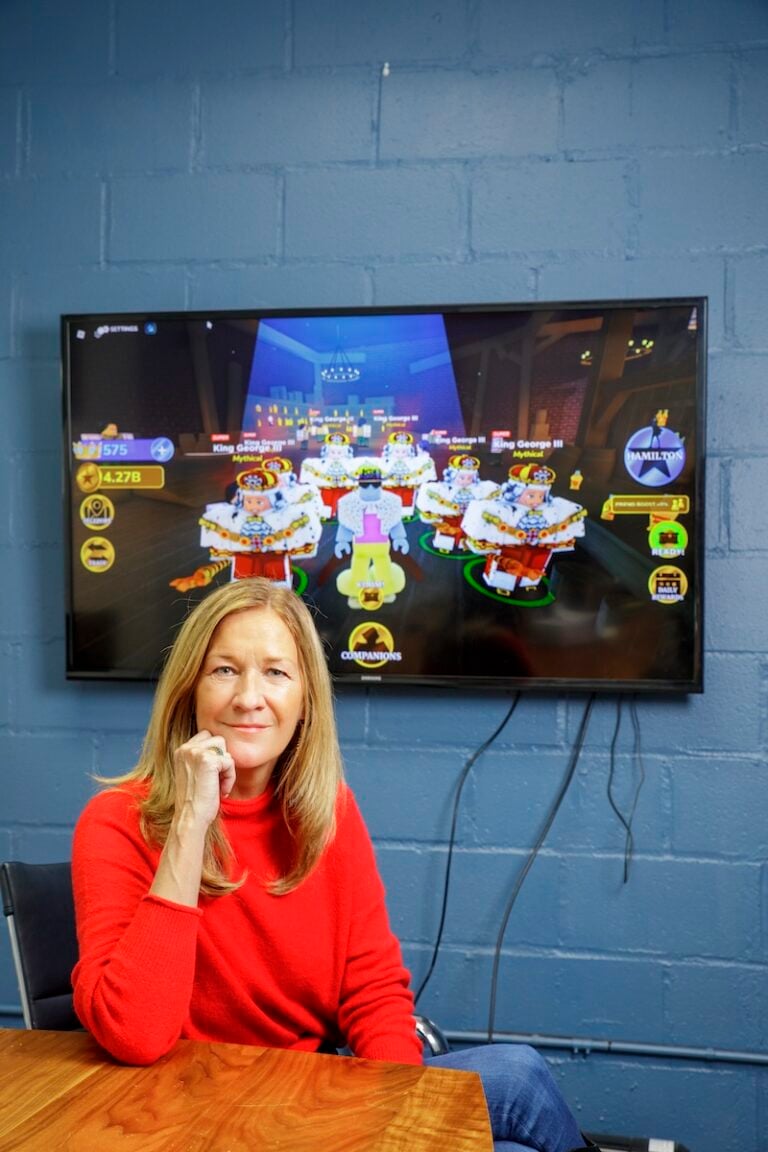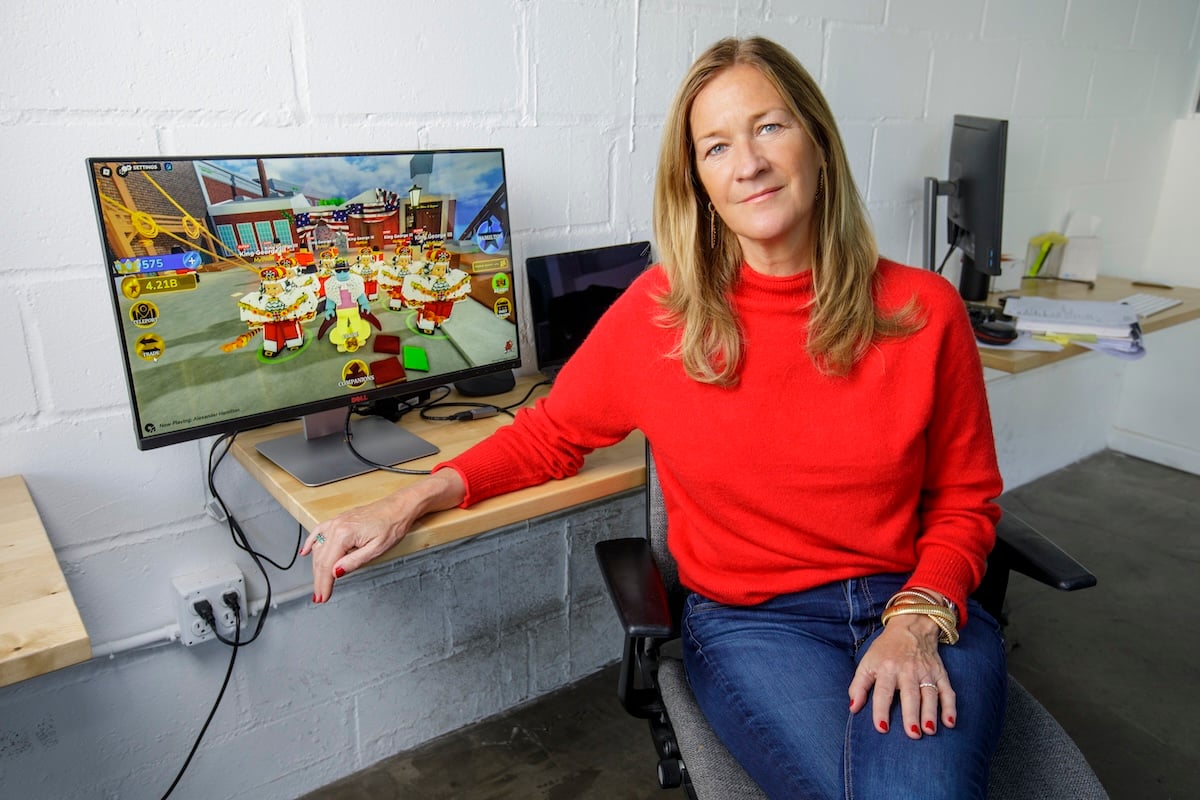
Over the last decade, Super League Enterprises Inc. had placed its focus on video game creation and esports event organization. In the last two years, though, the Santa Monica-based company has pivoted considerably, moving away from its work with esports and toward enabling companies to create and publish digital advertising campaigns for their brands and intellectual property on gaming platforms like Roblox and Minecraft.
While rebranding itself, Super League is taking action to address its declining stock price and pursue new patents for its proprietary cloud-streaming technology.
Super League went public in 2019 amid what Chief Executive Ann Hand called a “frothy” market. Since its founding in 2014, Super League – previously called Super League Gaming Inc. – broadcasted esports events, hosted recreational esports tournaments, and produced such original titles as “Anime Battlegrounds X.”
Hand said that it was focused on supporting smaller esports and specialized in running recreational video game events. This included a massive operation of hosting esports league events at movie theaters through partnerships with such chains as Cinemark Holdings Inc., Regal Entertainment Group and AMC Entertainment Holdings Inc.
But Hand said that Super League’s operations had become too niche, and betting its future on esports was “too narrow.”
As valuations for esports teams skyrocketed in 2019 and 2020, an industry “bubble” was discussed by analysts, and Hand realized it was time to move away from just broadcasting esports tournaments. This led to the development of its new platform, built on a portfolio of business-to-business ad tools and media products, that helps companies create “immersive, branded in-game experiences” based on the brands’ IP. These “experiences” are published as virtual advertising campaigns on Roblox, Minecraft and other media platforms. Roblox is a gaming platform where users program and publish their own new games and interact with each other in a virtual world. Minecraft is a sandbox building game – meaning gameplay allows players to interact with each other and set their own objectives – where users can communicate with each other within the game’s world.
Forget gaming
Now, Hand tells brands to forget the word “gaming,” and to think of Roblox as another social media channel. Roblox reported 70.2 million daily active users and 16 billion hours of engagement in the third quarter of this year.
“We’re kind of timed in an interesting spot to be a leading company at the explosion of this new kind of form of social media and digital ‘hangouts,’” Hand said. “There was a conscious decision to say, we need to think more broadly than esports. That was a decision that we started making in early 2020, and then the pandemic just put lighter fluid on that strategy.”
In its move away from esports, Super League personally dropped the word “gaming” from its vernacular, changing its name from Super League Gaming to Super League Enterprises Inc. in September. It subsequently renamed its stock on the Nasdaq as “SLE,” from its previous ticker “SLG.”
“What we were doing was too much of a niche,” Hand said. “The reason we changed our name, and we took out the word ‘gaming,’ is because, while we do have some owned and operated games and servers inside Minecraft and Roblox, what we really are at our core is a B2B innovation engine.”
Super League now operates four divisions of business: a creative studio that publishes immersive, branded gaming experiences, a suite of proprietary media products, strategic consulting services for brands and cloud-streaming technology. It also repurposed the tech that was previously used to stream esports events and has seven active patents. Super League received two of those patents in October, including one for AI-driven live stream content optimization.
Super League said it served about 80 brand clients last year and works with Burbank-based Walt Disney Co., media corporation iHeart Media Inc., El Segundo-based Mattel Inc., The Lego Group, Glendale-based DreamWorks Animation LLC, The Kraft Heinz Co., Burbank-based Warner Bros. Entertainment Inc. and The Hershey Co.
Rocky times?

Amid these changes to its business strategies, Super League has faced some financial woes. After a $25 million initial public offering in early 2019, the company’s stock dropped about 74% by the end of the year. In October of last year, it was notified by the Nasdaq that it was not in compliance with listing guidelines due to its stock dropping below $1 a share for more than 30 days.
Super League implemented a $2.2 million underwritten public offering in August and a reverse stock split at the beginning of September, the latter of which reduced the number of shares from 72 million to 3.6 million. By Sept. 25, the company regained compliance with the Nasdaq’s bid price requirement. Its stock closed on Thursday at $1.59 per share and has not gone above $2 since mid-September.
No regrets
Despite these matters, Hand has no regrets about going public and said that Super League’s market capitalization is approximately $25 million to $30 million. She said that, while Super League was “pre-revenue” upon its IPO, the market was incredibly healthy, and she is optimistic about the company’s future.
“I often wonder if the company would still be around if we hadn’t gone public,” Hand said. “It costs money to be public and sometimes it’s not fun to be burdened with that extra operating expense on your profits and losses … if not for those opportunities in 2020 and 2021 where we could very quickly grab money to enable the company to really lock into this more compelling business model, I don’t know if we would have made it.”
Super League’s third quarter report showed 60% year-over-year revenue growth, with $7.2 million of quarterly revenue. Gross profits for the third quarter totaled $2.5 million, up 42% from the same period last year. The company said it closed three “seven-figure” deals this year, compared to a single deal in 2022 over $1 million, and is anticipating at least $9 million of revenue in the fourth quarter. It did not provide projections for fourth quarter earnings but said it is on an “aggressive march” to profitability.
During its rebranding, Super League executed a series of acquisitions including Roblox ad platform Bloxbiz, Santa Monica-based video game streaming company Mobcrush Streaming Inc., both in 2021, and of game studio MelonVerse this July. The deals’ values were not disclosed, but a Super League spokesperson said that it generally targets acquisitions in the $5 million to $20 million range.
Hand said these acquisitions were intended to provide Super League with specific resources: Bloxbiz’s ad tech stack to deploy immersive media products into Roblox, Mobcrush’s sales team and Melon’s game development studio. Melon, which is based in Santa Monica, has built specific gaming products for Super League’s brand clients, including Chipotle Mexican Grill Inc.
Going forward, Hand does not believe the video game industry will slow down, but feels Super League is equipped to be a leader in its field. With its deal sizes and revenue increasing, she said the changes Super League has made have put it “on the crest” of taking off and that the company’s tools are becoming a standard part of brand campaigns.
“These things take time, to find your business model, to find the right market opportunity, but I feel like we finally have that product-market fit timing,” Hand said. “We finally got it right.”
